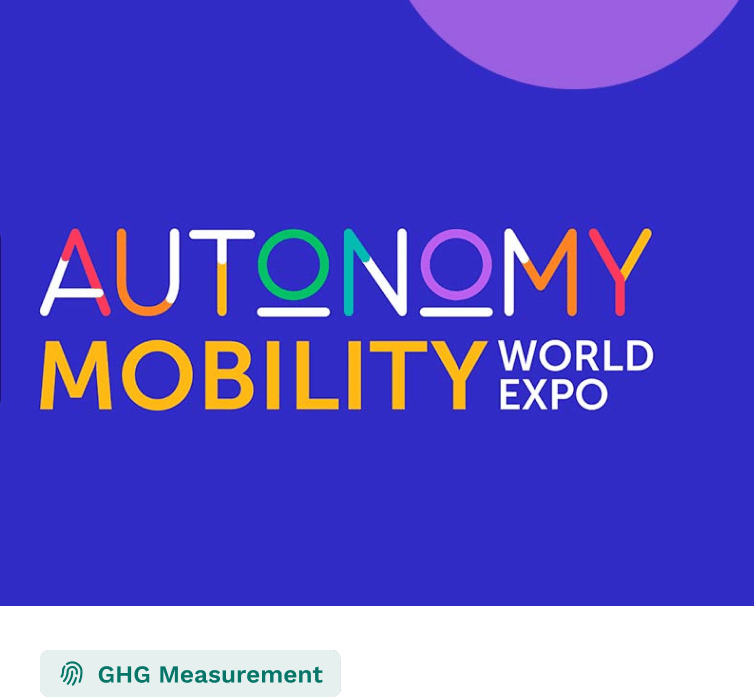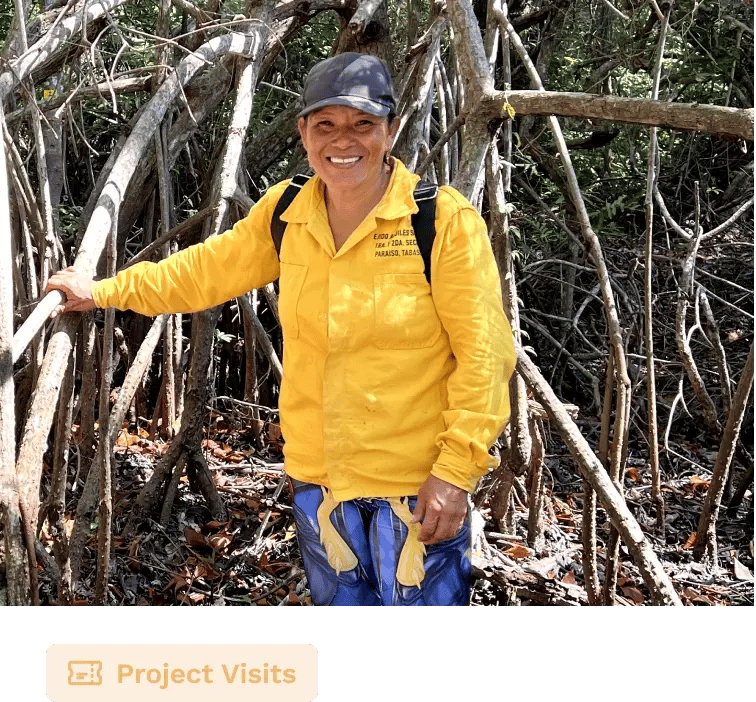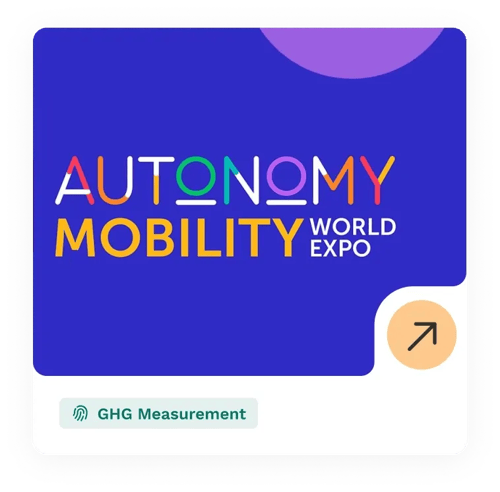Autonomy Mobility World Expo (AMWE)
The Autonomy Mobility World Expo (AMWE) is recognized as the leading global event dedicated to sustainable urban mobility. Every year, it brings together international decision-makers, institutions, NGOs, as well as innovative companies and startups in the sector.
The event has gradually included decarbonization technologies, such as solar energy, battery storage, and autonomous vehicles. Each edition introduces new themes and innovations in sustainable mobility, with conferences and exhibitions addressing the latest trends and challenges in the industry.
Keys elements
527 tCO2
of equivalent GHG emissions
(Summit Paris 2024)
250
exhibitors redefining the future of mobility
80%
of the stands were modular, reducing the use & transport of materials
The main initiatives
During the organisation of the Autonomy Mobility World Expo 2024 event, held on 20 and 21 March 2024 in Paris, a number of concrete actions were taken to promote sustainability and reduce the event's carbon footprint.
Modular stands
80% of stands were modular with reusable wooden structures. Exhibitors with unfinished stands were strongly encouraged to use local suppliers to minimise the transport of materials.
Sustainable catering
Meals were provided by local caterers with vegetarian options and no red meat options. The annual dinner, which was entirely vegetarian, was prepared by an official caterer to optimise the transport of produce.
Selection of sustainable suppliers
Choice of suppliers based on their commitment to sustainability, with strict criteria on materials and sustainable practices. Carpeting was removed from all aisles and its use on stands was minimised.
Encouraging sustainable mobility
Les participants ont été encouragés à privilégier les transports en commun et d'autres solutions de mobilité durable.
Waste & water management
Installation of water fountains to limit the use of plastic and introduction of waste sorting procedures.
Communication on sustainability
A comprehensive campaign promoted sustainable practices via technical guides, the website, social media and on-site displays.
Who is Our Support For?
Whether you are an SME, a mid-sized company, or a large corporation, a beginner or already an expert, we tailor our support to your challenges and your level of maturity.
Businesses
Maturity Level
Multi-Sector
Carbon Footprint Result
In 2024, ClimateSeed was the decarbonization partner of the Autonomy Mobility World Expo (AMWE). In this context, we present the results of the GHG assessment for this edition..
Measuring Autonomy's event carbon footprint
Autonomy collaborated with ClimateSeed to carry out a comprehensive assessment of its GHG emissions at its annual summit, held from March 20 to 21, 2024.
The assessment revealed that total GHG emissions for the event amounted to 527 tCO2e. This figure is equivalent to around 220 round-trips by plane between Paris and New York, or 1,146 round-trips by car between Paris and Berlin. The result represents an average emission of 0.2 tCO2e per participant.

Participants details
Participant transport is the largest emitting category with 273 tCO₂e, representing 51.7% of the balance sheet total. Of these emissions, the majority come from short journeys of less than 700 km, which make up 63.9% of the total. Medium-sized journeys, covering distances of 700km to 3,700km, account for 20% of emissions. Emissions linked to travel in France amount to 9.2%, compared with a national average of 7%.

Our Methodology
Carbon accounting categorizes GHG emissions resulting from human activities according to defined boundaries, taking into account time, organization, and function.
The GHG Protocol and the BEGES are widely used for this purpose, primarily for emissions related to organizations, but also for GHG assessments related to events.
ClimateSeed has built its framework using these methodologies as a reference. By adhering to their principles regarding scope, calculations, and categorizations, while considering event-specific data and reporting requirements.
Recommendations
Here are ClimateSeed's recommendations for reducing the carbon footprint of future events:
Encourage environmentally-friendly modes of transport
To reduce emissions linked to participant travel, it's crucial to implement a proactive communication campaign well in advance of the event. This campaign should inform participants about the various public transport options available. It is also advisable to work with local transportation services to offer discounts or benefits to participants who choose environmentally-friendly modes of transport. Clear communication in advance will help maximize the adoption of these sustainable transportation solutions.
Reduce the carbon impact of suppliers
To minimize the carbon footprint associated with procurement, it is crucial to give preference to local suppliers. By selecting companies located close to the event, this reduces transport distances while supporting the local economy. This approach helps to limit emissions associated with the movement of goods, and promotes more sustainable logistics. It is also advisable to work with partners who share sustainability values and are committed to eco-responsible practices, thus reinforcing the positive impact of the event.
Adopt a phygital approach: Offer online access to conferences to reduce the need for physical travel.
Use reusable materials: It is important to continue to favour the use of sustainable, reusable or rented materials.
Optimising the catering service: Efforts must be made to reduce meat consumption during meals at the event, and to encourage recycling in order to limit the amount of waste sent to landfill sites.

Le calcul de l'empreinte carbone du salon Autonomy était une opportunité précieuse pour identifier les sources d'émissions les plus importantes. Le partenariat avec ClimateSeed a permis de mieux comprendre les habitudes des participants et des prestataires, et de collaborer avec eux pour diminuer l’empreinte commune actuelle et future.

Adeline Larroque
Sustainable Event expert of Autonomy
Explore our other
Customer & Project Stories

Ferrari
The sustainable community & innovative initiative project

Autonomy
The largest trade show dedicated to sustainable urban mobility

Agroforestry in Pendjab
Discover our visit in India

ChangeNow
The biggest event organized for the planet

Women's forum
Highlight the link between climate change and gender equality

Mangrove Conservation
& Restoration in San Crisanto

Wool and the Gang
The company with a unique approach to craftsmanship

EuroAirShip
A sustainability trailblazer in aviation

Will Solutions
Sustainable community project in Canada
